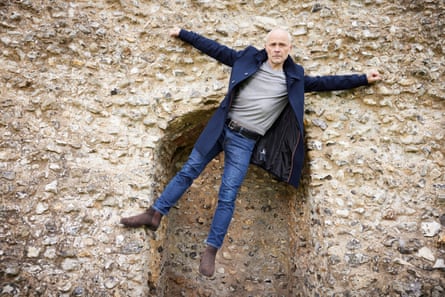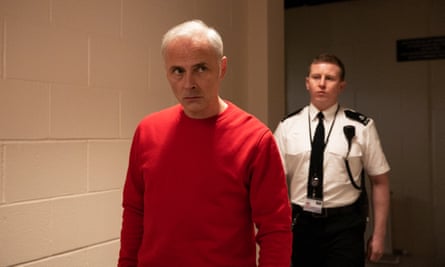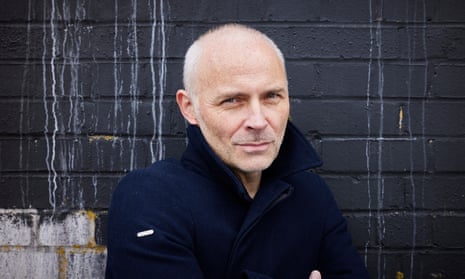Two brothers are driving home from a wedding slightly the worse for wear. In the middle of an argument, the car careers into an old man, killing him instantly. The older brother, played by Mark Bonnar, snaps into focus. If they call the police and admit their crime, he says, their lives will be over. However, if they do exactly what he says – move the body, drive off, forget about it – then it will be like it never happened. But can they live with themselves afterwards? Could you?
That’s how Guilt – the gripping, Hitchcockian show about their descent into more and more law-breaking – kicked off, instantly living up to its name. “I didn’t need to read any more than that,” says Bonnar, recalling his decision to take the role. “It’s an amazing opening. I went: ‘Absolutely, yes.’”
We should be glad he did. Not only did Neil Forsyth write the role of the sociopathic older brother with Bonnar in mind, but the actor excelled in it, with the series launching to acclaim in 2019. As Max, he is quick and angry and sharklike. He deserves to go down alongside the top tier of violent screen sociopaths – Trainspotting’s Begbie, Sexy Beast’s Don Logan, Daniel Plainview from There Will be Blood. He’s an unshackled force of nature straining to bend the entire world to his whims.
And yet – at least over Zoom – the Edinburgh-born actor bears no trace of him. He’s a warm and twinkly presence, munching on a slice of toast. While his role is something of a revelatory performance, he is keen to emphasise that it was hardly a breakout role. “According to a lot of people I am in everything and they’re sick of the sight of me,” he smiles. “I’ve been doing this for over 25 years. But I think if you believe you’ve got a voice that can hold you apart a little bit and you stick at it, people eventually go: ‘All right. Come on.’”
It is true that Bonnar has certainly been around. After concentrating on theatre work in the 1990s, he has steadily clawed up television’s ranks, from cop show bit-parts and Casualty to grabby supporting roles in the likes of Line of Duty (where he played a corrupt police officer), Unforgotten (where he played a violent victim of abuse), Eric, Ernie and Me (where he played Eric Morecambe) and Catastrophe, in which he was the world’s least happily married man. But Guilt represents yet another leap forward. He’s a leading man now, and a spectacular one at that.
The second season of Guilt is about to start, building upon the relentless propulsion of the first by dropping Max into an altogether new situation. There’s less guilt this time; rather, the motivating force is vengeance.

“In the first series, Max was always on the run, from either himself or the situation,” says Bonnar. “But in this series you experience him in all kinds of different situations. [He’s lost his] status, and he’s out to seek revenge.”
Luckily, the show’s eye for comedy is just as present as it was last time around, and it remains just as inescapably dark. Max’s full-throttle rage is so close to the surface that it still bubbles up at inopportune moments; the first episode could easily double as the pilot for a sitcom about the world’s most furious interior decorator.
“Neil’s bugbear was that all these hard-hitting heavy dramas have absolutely no sense of humour,” Bonnar explains. “And the one thing that you rely on in a crisis, or in times of extremes, is your sense of humour. Some of the best jokes are about funerals or people dying or whatever. Laughter and tears are two sides of the same coin.”

Despite the glut of roles he’s taken on in the past two decades, the 52-year-old was a relatively late bloomer. After a childhood spent moving around Scotland to accommodate the career of his father Stan, the environmental artist responsible for creating Glenrothes’ iconic concrete marching hippo sculptures, he settled in Edinburgh in the early 1980s. “But also my mum drove a bus,” he says. “She worked for the NSPCC, and was a social worker and a playgroup leader on a playbus. So yes, my dad was an artist and there was all kinds of stuff around the house, but I also had this mum who was at the forefront of, not women’s lib, but quietly getting on with driving a doubledecker bus around Edinburgh.”
Did having a parent in the arts make it easier to become an actor? “Probably,” he says, nodding. “I’m damn sure my mum and dad got nervous when I said I was going to be an actor. But they stood behind me in everything I did, even when I was a … ” He pauses. Was a what? “Actually, no, they didn’t really enjoy me being a door-to-door salesman,” he replies. In his late teens, Bonnar took a job selling burglar alarms door to door. It’s a time in his life that still rankles. “That company was a bunch of shysters,” he scowls. “They just basically got impressionable young kids who were a bit lost, as I was at the time, and trained them up to get leads. Not to sell burglar alarms, but to get leads for salesmen to go in afterwards. And if the salesman didn’t make the sale, we didn’t get the money.”
That doesn’t sound like much fun. “It was the worst of all worlds,” he nods. “Getting threatened on a myriad of doorsteps as a 19-year-old because you’re not allowed to allow them to say no. Even if they say: ‘I’m not interested,’ you’ve got an answer for that.”
It is quite Glengarry Glen Ross, I say. “I love that movie for that very reason,” he grins. “I know the language. I know what they’re talking about. I know how hard it is seeing … Oh man, Jack Lemmon in that movie. They’re all great, but Jack Lemmon, he’s astonishingly good. I just saw his gravestone.” And then he’s up on his feet, patting down his pockets so he can show me a picture of the gravestone on his phone.

More constructive, meanwhile, was his time working for the local council, first in a library and then in the planning department. “There were a couple of guys in the office who were members of this amateur company called Leith Theatre,” he says. “I did three shows for them then realised you could act as a job. I owe Mikey and Duncan everything. We’re still pals – they’re the reason that I’m here.”
“Here”, let’s not forget, is the lead role in one of the best shows of the year. And, while series two of Guilt kicks off here, series one is still busy winging its way around the world. (“It’s just started airing in Sweden and France, and they’re remaking it in India.”) More impressively, it is currently airing to rave reviews on PBS in the US. Max is such a great role, and Bonnar so uniquely terrifying, that I wonder if there has been any feedback from America. Basically, has Hollywood come knocking yet?
“No,” he replies, giving the first hint of his onscreen steeliness I’ve encountered. Really? I ask. “Don’t think so,” he shrugs. But if Hollywood did come calling, would he consider it?
“No,” he repeats. “Why would I do that? I love it here. This is my home.” That sounds pretty definitive. He sighs. “I take each job on its merits. If a job’s good, and it’s worth doing for the reasons you want to do it, then I make that decision at the time. But I certainly wouldn’t pack up and ship off. I love being here.”
There’s another explanation for his eagerness to hang around, too. “I think for many years America has been held up as some kind of promised land in the film and television landscape,” he explains. “And certainly in the last 10 to 15 years, I think the UK has shown it can punch far above its weight. Guilt and its success is certainly proof of that.”
He isn’t wrong. Both Bonnar and Forsyth hint that Guilt was planned as a trilogy. If that’s the case, the third series cannot come quickly enough.
Guilt returns on BBC Scotland and iPlayer on 12 October, and BBC Two on 14 October.
